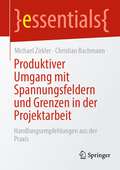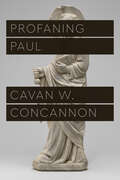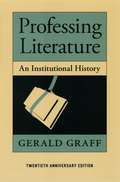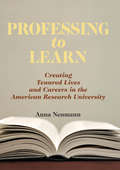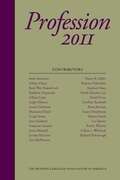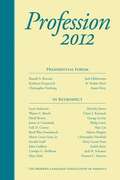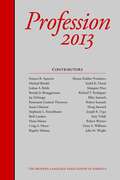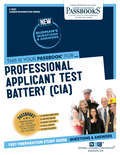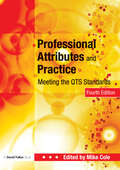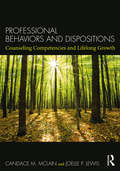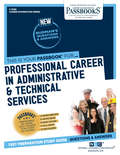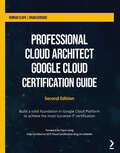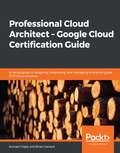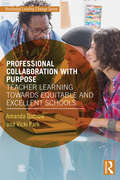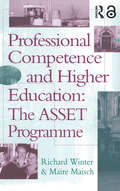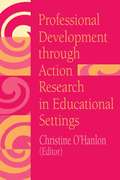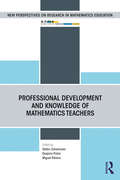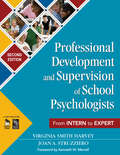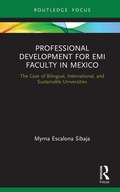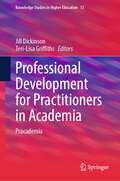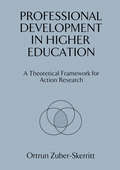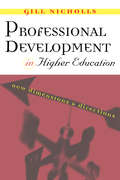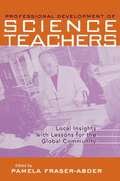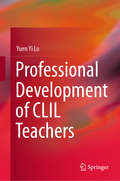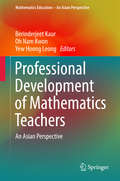- Table View
- List View
Produktiver Umgang mit Spannungsfeldern und Grenzen in der Projektarbeit: Handlungsempfehlungen aus der Praxis (essentials)
by Christian Bachmann Michael ZirklerProjektleitende erleben vielfältige Spannungsfelder in ihrer Arbeit und sind dabei besonders exponiert. Das Buch erklärt die verschiedenen Spannungsfelder, denen Projektverantwortliche ausgesetzt sind und zeigt, wie ein nachhaltiger Umgang über Grenzmanagement gelingen kann, damit die anspruchsvolle Aufgabe mit Freude, Erfolg und bleibender Gesundheit erledigt werden kann. Praktische Hinweise zur produktiven und nachhaltigen Gestaltung der Projektleitungsrolle werden aus Sicht der Praxis vorgestellt.
Profaning Paul (Class 200: New Studies in Religion)
by Cavan W. ConcannonA critical reconsideration of the repeated use of the biblical letters of Paul. The letters of Paul have been used to support and condone a host of evils over the span of more than two millennia: racism, slavery, imperialism, misogyny, and anti-Semitism, to name a few. Despite, or in some cases because of, this history, readers of Paul have felt compelled to reappropriate his letters to fit liberal or radical politics, seeking to set right the evils done in Paul’s name. Starting with the language of excrement, refuse, and waste in Paul’s letters, Profaning Paul looks at how Paul’s “shit” is recycled and reconfigured. It asks why readers, from liberal Christians to academic biblical scholars to political theorists and philosophers, feel compelled to make Paul into a hero, mining his words for wisdom. Following the lead of feminist, queer, and minoritized scholarship, Profaning Paul asks what would happen if we stopped recycling Paul’s writings. By profaning the status of his letters as sacred texts, we might open up new avenues for imagining political figurations to meet our current and coming political, economic, and ecological challenges.
Professing Literature: An Institutional History
by Gerald GraffWidely considered the standard history of the profession of literary studies, Professing Literature unearths the long-forgotten ideas and debates that created the literature department as we know it today. In a readable and often-amusing narrative, Gerald Graff shows that the heated conflicts of our recent culture wars echo—and often recycle—controversies over how literature should be taught that began more than a century ago. Updated with a new preface by the author that addresses many of the provocative arguments raised by its initial publication, Professing Literature remains an essential history of literary pedagogy and a critical classic. “Graff’s history. . . is a pathbreaking investigation showing how our institutions shape literary thought and proposing how they might be changed.”— The Norton Anthology of Theory and Criticism
Professing to Learn: Creating Tenured Lives and Careers in the American Research University
by Anna NeumannResearch, teaching, service, and public outreach—all are aspects of being a tenured professor. But this list of responsibilities is missing a central component: actual scholarly learning—disciplinary knowledge that faculty teach, explore in research, and share with the academic community. How do professors pursue such learning when they must give their attention as well to administrative and other obligations? Professing to Learn explores university professors’ scholarly growth and learning in the years immediately following the award of tenure, a crucial period that has a lasting impact on the academic career. Some launch from this point to multiple accomplishments and accolades, while others falter, their academic pursuits stalled. What contributes to these different outcomes? Drawing on interviews with seventy-eight professors in diverse disciplines and fields at five major American research universities, Anna Neumann describes how tenured faculty shape and disseminate their own disciplinary knowledge while attending committee meetings, grading exams, holding office hours, administering programs and departments, and negotiating with colleagues. By exploring the intellectual activities pursued by these faculty and their ongoing efforts to develop and define their academic interests, Professing to Learn directs the attention of higher education professionals and policy makers to the core aim of higher education: the creation of academic knowledge through research, teaching, and service.
Profession 2011 (Profession Ser.)
by The Modern Language Association of AmericaThis issue of Profession contains Sidonie Smith's introduction to her Presidential Forum (held at the 2011 MLA convention) and the essays of forum participants Hillary Chute, Marianne Hirsch, Leigh Gilmore, Craig Howes, Françoise Lionnet, Nancy K. Miller, David Palumbo-Liu, Brian Rotman, Leo Spitzer, Robert Warrior, and Gillian L. Whitlock. The issue also features a section on evaluating digital scholarship. Introduced by Susan Schreibman, Laura Mandell, and Stephen Olsen, the section includes essays by Steve Anderson, Kathleen Fitzpatrick, Jerome McGann, Tara McPherson, Bethany Nowviskie, and Geoffrey Rockwell. The issue's other essays are by Reed Way Dasenbrock, Gillian Gane, Laurie Grobman, Joyce Kinkead, David Porter, and Richard Yarborough. The issue concludes with two sets of MLA guidelines--on professional employment practices for non-tenure-track faculty members and on evaluating translations as scholarship--and a listing of reports, surveys, statements, and other resources recently added to the MLA Web site.
Profession 2012 (Profession Ser.)
by The Modern Language AssociationThis issue of Profession contains Russell A. Berman's introduction to his Presidential Forum, Language, Literature, Learning, held at the 2012 MLA convention, and the essays of the forum participants Kathleen Fitzpatrick, Christopher Freeburg, Jack Halberstam, B. Venkat Mani, and Imani Perry. To mark the journal's thirty-fifth anniversary, the issue also features a retrospective sampling of articles that illustrate the evolution of the profession and of the professional issues the journal has addressed since its inception in 1977. The retrospective section includes articles by Leon Anderson; Wayne C. Booth; Heidi Byrnes; James A. Castaeda; Erik D. Curren; Reed Way Dasenbrock; Henry Louis Gates, Jr.; Gerald Graff; John Guillory; Carolyn G. Heilbrun; Mara Holt; Dorothy James; Claire J. Kramsch; George Levine; Philip Lewis; Alan Liu; Helene Moglen; Christopher Newfield; Mary Louise Pratt; Judith Ryan; Jack H. Schuster; and Domna C. Stanton.
Profession 2013
by The Modern Language AssociationThis issue of Profession contains Michael Bérubé's introduction to his Presidential Forum, Avenues of Access, which was held at the 2013 MLA convention, and the essays of the forum participants: Joshua A. Boldt, Beth Landers, Maria Maisto, and Robert Samuels. The issue also features a section on a statistical study documenting the participation of people of color in humanities doctoral programs. Curated by the MLA Committee on the Literatures of People of Color in the United States and Canada, the section includes an introduction by Ifeoma Kiddoe Nwankwo and Richard T. Rodríguez; articles by Frances R. Aparicio, Robert Warrior, and Dana A. Williams; and a conclusion by Doug Steward. The issue's four other essays cover a variety of topics. Disability and access in higher education is the subject of a collaborative article by Brenda Jo Brueggemann, Jay Dolmage, Rosemarie Garland-Thomson, Susan Ghiaciuc, Stephanie L. Kerschbaum, Craig A. Meyer, Sushil K. Oswal, Margaret Price, Ellen Samuels, and Amy Vidali. Rogelio Miñana writes about a curricular experiment; superliteracy and doctoral programs are the focus of Joseph R. Urgo's article; and Julia M. Wright's topic is faculty governance.
Professional Applicant Test Battery: Passbooks Study Guide (Career Examination Series #C-3587)
by National Learning CorporationThe Professional Applicant Test Battery (CIA) Passbook® prepares you for your test by allowing you to take practice exams in the subjects you need to study. It provides hundreds of questions and answers in the areas that will likely be covered on your upcoming exam, including but not limited to: evaluating conclusions in light of known facts; memorization; abstract reasoning; logical reasoning; reading comprehension; understanding and interpreting written material; and other related areas.
Professional Attributes and Practice: Meeting the QTS Standards
by Mike ColeDrawing on the success of the first, second and third editions of Professional Values and Practice for Teachers and Student Teachers, this fully updated, comprehensive and accessible fourth edition provides practical advice to help student teachers and teachers prepare for their professional life. This new edition contains completely new chapters in response to the changing Standards and an updated chapter by the editor, Mike Cole, entitled Education and Equality: some conceptual and practical issues, which takes into account the major changes in equalities legislation. This will enable readers to situate the topics discussed in the rest of the book, which deal with the DfES Professional Attributes Standards needed to meet the 2007 Standards for the award of Qualified Teacher Status (QTS).
Professional Behaviors and Dispositions: Counseling Competencies and Lifelong Growth
by Candace M. McLain Joelle P. LewisProfessional Behaviors and Dispositions teaches counselors in training (CITs) how to cultivate counselor competencies and critical thinking skills in support of lifelong professional development. CITs will first gain a detailed understanding of the professional behaviors and dispositions expected of all counselors. They will then learn how to evaluate themselves for these factors using a universal growth model that promotes holistic, ongoing assessment of oneself and one’s relationships. Next, CITs will be presented with concrete tools and activities that they can use to cultivate and retain counselor competencies. Finally, CITs are given a step-by-step guide for creating a professional growth plan they can use throughout their program and their clinical practice. Accompanying this text is a helpful online faculty guide for supervisors to use while working with CITs. Aligned with CACREP, ACA, and ACES standards, this textbook will be useful for all graduate students training to become counselors.
Professional Careers in Administrative and Technical Services: Passbooks Study Guide (Career Examination Series)
by National Learning CorporationThe Professional Careers in Administrative and Technical Services Passbook® prepares you for your test by allowing you to take practice exams in the subjects you need to study. It provides hundreds of questions and answers in the areas that will likely be covered on your upcoming exam, including but not limited to: preparing written material; verbal analysis; quantitative analysis; understanding and interpreting written material related to government and social issues; and more.
Professional Cloud Architect Google Cloud Certification Guide: Build a solid foundation in Google Cloud Platform to achieve the most lucrative IT certification, 2nd Edition
by Konrad Clapa Brian Gerrard Yujun LiangBecome a Professional Cloud Architect by exploring the essential concepts, tools, and services in GCP and working through practice tests designed to help you take the exam confidentlyKey FeaturesPlan and design a GCP cloud solution architectureEnsure the security and reliability of your cloud solutions and operationsAssess your knowledge by taking mock tests with up-to-date exam questionsBook DescriptionGoogle Cloud Platform (GCP) is one of the industry leaders thanks to its array of services that can be leveraged by organizations to bring the best out of their infrastructure. This book is a comprehensive guide for learning methods to effectively utilize GCP services and help you become acquainted with the topics required to pass Google's Professional Cloud Architect certification exam. Following the Professional Cloud Architect's official exam syllabus, you'll first be introduced to the GCP. The book then covers the core services that GCP offers, such as computing and storage, and takes you through effective methods of scaling and automating your cloud infrastructure. As you progress through the chapters, you'll get to grips with containers and services and discover best practices related to the design and process. This revised second edition features new topics such as Cloud Run, Anthos, Data Fusion, Composer, and Data Catalog. By the end of this book, you'll have gained the knowledge required to take and pass the Google Cloud Certification – Professional Cloud Architect exam and become an expert in GCP services.What you will learnUnderstand the benefits of being a Google Certified Professional Cloud ArchitectFind out how to enroll for the Professional Cloud Architect examMaster the compute options in GCPExplore security and networking options in GCPGet to grips with managing and monitoring your workloads in GCPUnderstand storage, big data, and machine learning servicesBecome familiar with exam scenarios and passing strategiesWho this book is forIf you are a cloud architect, cloud engineer, administrator, or any IT professional looking to learn how to implement Google Cloud services in your organization and become a GCP Certified Professional Cloud Architect, this book is for you. Basic knowledge of server infrastructure, including Linux and Windows Servers, is assumed. A solid understanding of network and storage will help you to make the most out of this book.
Professional Cloud Architect – Google Cloud Certification Guide: A handy guide to designing, developing, and managing enterprise-grade GCP cloud solutions
by Konrad Clapa Brian GerrardBecome a Professional Cloud Architect by exploring essential concepts, tools, and services in GCP and working through tests designed to help you get certified Key Features Plan and design a GCP cloud solution architecture Ensure the security and reliability of your cloud solutions and operations Test yourself by taking mock tests with up-to-date exam questions Book Description Google Cloud Platform (GCP) is one of the leading cloud service suites and offers solutions for storage, analytics, big data, machine learning, and application development. It features an array of services that can help organizations to get the best out of their infrastructure. This comprehensive guide covers a variety of topics specific to Google's Professional Cloud Architect official exam syllabus and guides you in using the right methods for effective use of GCP services. You'll start by exploring GCP, understanding the benefits of becoming a certified architect, and learning how to register for the exam. You'll then delve into the core services that GCP offers such as computing, storage, and security. As you advance, this GCP book will help you get up to speed with methods to scale and automate your cloud infrastructure and delve into containers and services. In the concluding chapters, you'll discover security best practices and even gain insights into designing applications with GCP services and monitoring your infrastructure as a GCP architect. By the end of this book, you will be well versed in all the topics required to pass Google's Professional Cloud Architect exam and use GCP services effectively. What you will learn Manage your GCP infrastructure with Google Cloud management options such as CloudShell and SDK Understand the use cases for different storage options Design a solution with security and compliance in mind Monitor GCP compute options Discover machine learning and the different machine learning models offered by GCP Understand what services need to be used when planning and designing your architecture Who this book is for If you are a cloud architect, cloud engineer, administrator, or any IT professional who wants to learn how to implement Google Cloud services in your organization and become a GCP Certified Professional Cloud Architect, this book is for you. Basic knowledge of server infrastructure, including Linux and Windows Servers, is assumed. Knowledge of network and storage will also be helpful.
Professional Collaboration with Purpose: Teacher Learning Towards Equitable and Excellent Schools (Routledge Leading Change Series)
by Amanda Datnow Vicki ParkBuilding on both cutting-edge research and professional learning practice, Amanda Datnow and Vicki Park explore how professional collaboration can support deeper learning for students and teachers alike. While many schools and systems support teacher collaboration, they often fall short of their intended goals of improving teaching and learning. This book provides concrete guidance for creating the conditions for collaboration in which teachers are moved toward—rather than repelled—by joint work. The authors explore how collaborative settings can provide a space for working through the inevitable challenges that accompany the changing nature of teaching in the age of accountability and show the motivation, inspiration, and energy that teachers personally--and collectively--gain from collaborating to improve student learning. Ultimately, they show how teacher empowerment towards working together builds equitable and excellent learning environments.
Professional Competence And Higher Education: The ASSET Programme
by Maire Maisch Richard WinterFirst published in 1996. Routledge is an imprint of Taylor & Francis, an informa company.
Professional Development Through Action Research: International Educational Perspectives
by Christine O’HanlonWritten from various perspectives, this book describes ways of using action research to improve teaching and learning. It includes contributions about action research related to: political action; school inclusion; distance learning; feminism; and initial teacher training. The coherent theme of the book is the consistent appraisal of action research as a means of supporting the transformation of educational praxis through practical enquiry and reflexive practice.
Professional Development and Knowledge of Mathematics Teachers (European Research in Mathematics Education)
by Stefan Zehetmeier; Despina Potari; Miguel RibeiroMathematics teaching and professional development of mathematics teachers are areas where research has increased substantially in recent years. In this dynamic field, mathematics teaching practices, pedagogical knowledge of mathematics teachers and professional development via collaboration between mathematics teachers have emerged as vital domains of inquiry. Professional Development and Knowledge of Mathematics Teachers addresses the underlying characteristics of mathematics teacher education, and those professional development contexts that have a positive impact on teachers’ professional learning. Recognizing the impact of broader institutional settings on mathematics teaching and teacher professional development, the editors suggest bridging the gaps between theoretical practices and methodological approaches in the field by focusing on and conceptualizing the following relational factors: The study of mathematics teaching and classroom situations Researching teacher and teacher educator knowledge, since these issues inform the quality of mathematics teaching directly Mathematics teacher education and professional development, focusing on design principles and the impact they have on teacher professional learning Combining central issues of mathematics teaching, knowledge and professional development, the chapters in this volume address each of the above factors and provide profound considerations on both theoretical and practical levels. This book will be an essential resource for researchers, teachers and students working in the fields of mathematics teaching and mathematics teacher professional development.
Professional Development and Supervision of School Psychologists: From Intern to Expert
by Virginia Smith Harvey Joan A. StruzzieroEssential for fostering the professional development and enhanced competency of school psychologists, this book discusses administrative and clinical supervision and offers vignettes, assessment tools, and methods for evaluating professional growth.
Professional Development for EMI Faculty in Mexico: The Case of Bilingual, International, and Sustainable Universities (Routledge Focus on English Medium Instruction in Higher Education)
by Myrna Escalona SibajaDespite Mexico’s implementation of a bilingual model in its tertiary education programmes, this book is the first contribution to knowledge regarding EMI in Mexico. The author introduces readers to the Mexican higher education context before providing detailed information regarding the technological and polytechnic subsystem, where EMI has been implemented since 2012. The volume details a pilot and case study conducted in Mexican universities as well as the research findings and conclusions. It closes with recommendations, as well as suggestions for further research. The book explores the implications for the continuous professional development and training for lecturers in the current shift to EMI in Bilingual, International, and Sustainable (BIS) universities. This volume will be of particular interest to researchers in EMI and bilingualism.
Professional Development for Practitioners in Academia: Pracademia (Knowledge Studies in Higher Education #13)
by Jill Dickinson Teri-Lisa GriffithsThis multi-disciplinary collection addresses issues relating to current or former practitioners within the context of higher education. Drawing together a range of voices, the contributors explore contemporary issues organised around three core themes of pracademic identities, professional development, and teaching practice. Underpinned by theoretical frameworks, reporting empirical findings, and adopting a reflective lens, this critical examination draws on a range of experiences to provide a deeper understanding of the contribution of pracademics within the sector for stakeholders, including leaders, policy makers and professional bodies, and current and future pracademics. Dedicated to highlighting the potential of the pracademic contribution, this collection explores key topics including building networks, practice-informed teaching, consultancy, and collaborative research. Contributions investigate some of the practical barriers faced by pracademics making the transition into higher education, including imposter syndrome, cultural adjustment, and managing dual professional identities. The aim of this collection is to champion the benefits of a diverse academy for everyone involved.
Professional Development in Higher Education: A Theoretical Framework for Action Research
by Ortrun Zuber-SkerrittThis study offers a theoretical framework for professional development in higher education and examines the priorities for teachers' careers in the 1990s. It may be used as a companion volume to the author's work, "Action Research in Higher Education".
Professional Development in Higher Education: New Dimensions and Directions
by Gill NichollsStaff development and teaching accreditation is becoming a reality in UK higher education teaching. This volume explores the implications of continued professional development and institutions such as the ILT, outlining the options and approaches to professional development.
Professional Development in Science Teacher Education: Local Insight with Lessons for the Global Community (Reference Books in International Education)
by Pamela Fraser-AbderThis book explores global issues in the professional development of science teachers, and considers classroom applications of teacher training with a comparative lens. The twelve studies collected in this volume span five continents and vastly differing models of teacher education. Carefully detailing the social and cultural contexts for the teaching of science, this is a guidebook for anyone concerned with equity and reform in professional development.
Professional Development of CLIL Teachers
by Yuen Yi LoThis book investigates how teacher educators can facilitate the professional development of Content and Language Integrated Learning teachers, and discusses the effectiveness of such efforts and factors affecting it. It proposes theoretical models of professional development for Content and Language Integrated Learning teachers, documents empirical evidence showing the effectiveness of the models, and sheds lights on the various methodological approaches for research in the field.
Professional Development of Mathematics Teachers
by Berinderjeet Kaur Oh Nam Kwon Yew Hoong LeongThis book offers a counterpart to the extensive corpus of literature available on the same topic from a Western perspective. It showcases innovative approaches to professional development of mathematics teachers in Asian countries, and reports on both empirical and expository studies of teachers' professional development in these counties. It provides scholars from non-English-speaking and under-represented Asian countries the opportunity to engage in discourse with other scholars in the field, and is the first book to present substantial contributions from scholars in Asia on the professional development of mathematics teachers in their respective countries. It includes perspectives that shed valuable light on how the approaches pursued in Asian countries resemble or differ from those in the West.
